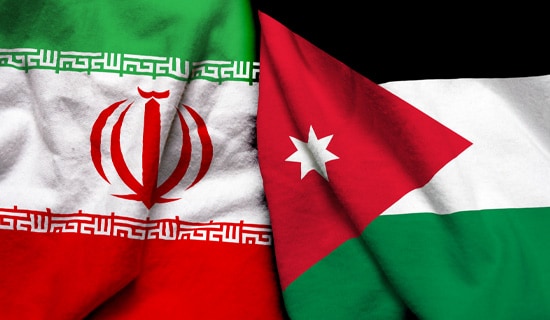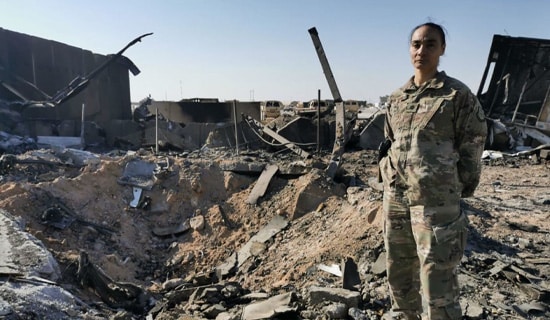Russian commentators, especially when they feel rebuffed by the West, frequently raise the idea of Eurasia as both an ideological and economic substitute.[1] Russia's political system is presumably a hybrid of European and Asian values, and Eurasia will provide economic opportunity for Russia. The following article by Rustem Falyakhov shows that China is clobbering Russia in the former Soviet Republics of Central Asia. At best, the Chinese let Russia operate military bases in the area, while they clean up economically in what a Russian expert calls a "most sophisticated variant of colonialism."
Falyakhov's article follows below:[2]

Chinese President Xi Jinping (L) with ousted Kyrgyz President Sooronbay Jeenbekov (Source: Cgtn.com)
"The recent protests in Kyrgyzstan showed the country's dependence on the neighboring PRC [People's Republic of China]. It emerged that during the riots, Chinese business was badly damaged by looters. In the republic with a population of 6 million people, there are about 400 companies, connected one way or another with China. And Russia, it seems, is losing its influence not only in Kyrgyzstan, but also in other republics of Central Asia, note the experts.
In Kyrgyzstan, after the October 5 riots in the context of the elections, gold mining enterprises still cannot reopen. They were set on fire and plundered by looters. At the Jerooy gold mine, they not only took away the mined gold, but even pulled out washing machines and plumbing equipment from the factory's laundry - they took everything, a source in Bishkek told Gazeta.ru.
"Work at the Bozymchak gold-copper mine has also been suspended. A branch of the Kyrgyzkomur enterprise was seized at the Kara-Keche coal deposit, where about 500 thousand soms (about half a million rubles) were stolen. The protesters are pushing for a change in the mine's leadership and the uncontrolled loading of coal trucks.
"Other mines producing gold, platinum and coal were also affected.
"In 2005 and 2010, when the revolutions took place in Kyrgyzstan, the Chinese suffered the most - the largest Chinese shopping center, Goin, was burned twice in the capital. There were several clashes with employees of the Chinese company Zhong Ji Mining, which mines gold at the Solton-Sary deposit, ”says Alexander Bannikov, a Kyrgyz journalist and expert at the Center for European and Asian Studies.
"In order to understand the essence of the confrontation between the Kyrgyz and the Chinese, it is enough to recall the story of how last year a massive brawl occurred at the Soltan-Sary field. Then the Kyrgyz and the Chinese threw stones at each other, 39 people suffered injuries - these [figures include] only those who were hospitalized.
"The Kyrgyz are convinced that due to the blasting during the development of the field, the surrounding area is contaminated, with the result that the sheep of local residents are dying. "The Chinese company paid compensation to the animals' owners.
"The revolutionary events of this October exposed the problem of Kyrgyzstan's dependence on China. As it turns out now, in this small Asian republic with a population of 6 million people, there are about 400 companies owned by Chinese investors or belonging to a joint Chinese-Kyrgyz business. At the same time, there are many Russian, Turkish and even South Korean companies in the republic.
"The Chinese presence began to increase sharply because Kyrgyzstan in recent years was ומable to develop the economy, the country got bogged down in a struggle between rival clans and was forced to actively borrow from the PRC."
SUPPORT OUR WORK

Russia Forgives Debts, The Chinese Get The Borrower Hooked On Them
"According to the calculations of Natalya Milchakova, deputy head of the “IAC Alpari”, in 2008, Kyrgyzstan’s debt to China was only $ 10 million, and in less than 12 years it grew 170-fold.
"'Russia forgives debts to its neighbors and EAEU partners. Since 2013, our country has written off the total sum $ 500 million of Kyrgyzstan's debts. And while we forgive debts, China has successfully gotten our partner in the EAEU "hooked" on its inexpensive loans. And since Kyrgyzstan has no money [to pay them back], they have to give natural resources instead.” - says Milchakova.
"As a debt payment, China took away some mineral deposits in neighboring Tajikistan. At the end of 2019, Tajikistan’s external debt to China amounted to $ 2.9 billion, or almost 60% of the total external debt.
"Kyrgyzstan's Chinese debts amount so far only to 26% of total external debt (at the end of 2019 it was $ 4.6 billion).
"'That is, the Chinese authorities, relatively speaking, have a controlling interest in Tajikistan and a blocking stake in Kyrgyzstan. Kazakhstan's debt to China is about $ 11 billion, but the Chinese embrace is not that terrible for the country, since this debt does not exceed 10% of the country's total external liabilities.' - explains Milchakova.
"'Kyrgyzstan and Tajikistan simply have no other option but to borrow money for development, taking into account their deficit budget.” – stated the Valdai Club expert Stanislav Tkachenko, Club, professor at St. Petersburg State University, visiting professor at the Center for Economics and Policy Studies of Countries in Transition, Liaoning University of Science and Technology.
"'Tajikistan asked for a loan from Russia, we turned them down. Kyrgyzstan, however, receives money through the Stabilization Fund of the Eurasian Union, but this is a mere pittance compared to the Chinese loans.' – stated Professor Tkachenko.
Professor Tkachenko: China Is At Least Ten Times More Powerful Than Russia
Comparing Russia and China's opportunities for influence in Central Asia, Tkachenko suggests the following metaphor:
"'Imagine that you are ready to participate in a chess competition, but your opponent arrives with a baseball bat. Who will win? Of course, China, which is at least ten times more powerful than Russia. Including from the financial point of view.' - said Tkachenko."
Russia effectively surrendered to China in the struggle for influence in the former Soviet republics of Central Asia. The expert does not rule out the possibility that informal agreements exist between Russia and China on a functional division in the post-Soviet space.
"'China, if possible, does not interfere in the politics of these states, it builds, extracts [resources], develops business, [provides] loans; and for Russia it is important to control security, geopolitics, we have military bases and a spaceport there.' - points out Tkachenko.

Stanislav Tkachenko (Source: Iz.ru)
The purpose behind the increased Chinese presence in Central Asia is the implementation of the 'New Silk Road project', says Alexander Losev, General Director of Sputnik Capital Management.
"'These three republics are a key region for the creation and control of transport and logistics in the "East-West" corridors (from China to Europe and to the Middle East) and North-South ones (to India and Pakistan). For China, geopolitics and economics are intertwined here, and it is not surprising that China dominates in these regions.' - argues Losev.
"But Russia does not have a clear economic policy on the vast territories of the former USSR.
"'For the successful economic integration of the Central Asian countries and Russia, a common system of bookkeeping is necessary, but Russia, unlike China, cannot offer it to these republics. The ruble has been one of the worst [performing] currencies in the world since the beginning of 2020.' – says Losev, adding that Moscow also lacks the political will to create effective EAEU institutions.
"According to Milchakova, China, as the number one creditor in Central Asia, has significant influence there, just as the UK and other Western countries once enjoyed in China.
"'All Chinese business' proceeds from the sale of precious metals and other natural resources remain in Kyrgyzstan and Tajikistan, taxes are paid to the budget, jobs are created for both the Chinese and the local population. China influences post-Soviet countries through soft power. China is interested in the stability of the economy and politics in these countries, it is against revolutions.' – argues Milchakova.
"Alexander Bannikov partially agrees with her.
"'The Kyrgyz are afraid of the Chinese, but they still borrow money, paying it back with resources. There is nothing else. Worse, all projects are carried out by Chinese comrades with the introduction of their workers to Kyrgyzstan, who then remain in the country. The Chinese are conducting an expansion via a quiet labor migration and have a guaranteed market for the gold. The Kyrgyz Ministry of Finance is buying it. This is the most sophisticated variant of colonization.' - sums up Bannikov."

Rustem Falyakhov (Source: E-vid.ru)
[1] MEMRI Inquiry and Analysis No. 1239, Understanding Russian Political Ideology And Vision: A Call For Eurasia, From Lisbon To Vladivostok, March 23, 2016.
[2] Gazeta.ru, October 15, 2020.




